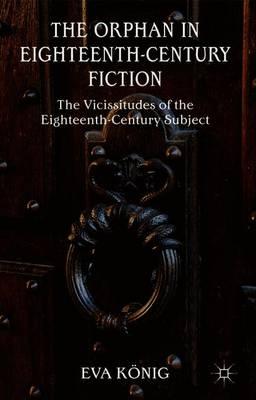Overview
The Orphan in Eighteenth-Century Fiction explores how the figure of the orphan was shaped by changing social and historical circumstances. Analysing sixteen major novels from Defoe to Austen, this original study explains the undiminished popularity of literary orphans and reveals their key role in the construction of gendered subjectivity.
Full Product Details
Author: E. König
Publisher: Palgrave Macmillan
Imprint: Palgrave Macmillan
Dimensions:
Width: 14.00cm
, Height: 2.00cm
, Length: 21.60cm
Weight: 0.490kg
ISBN: 9781137382016
ISBN 10: 1137382015
Pages: 277
Publication Date: 29 May 2014
Audience:
Professional and scholarly
,
Professional & Vocational
Format: Hardback
Publisher's Status: Active
Availability: In Print

This item will be ordered in for you from one of our suppliers. Upon receipt, we will promptly dispatch it out to you. For in store availability, please contact us.
Reviews
Konig's study ... remains a valuable contribution to studies of identity in the novel, one which convincingly argues for the significance of orphaned characters in eighteenth-century fiction, and which makes a clear argument for the psychic function of narratives featuring orphan figures. This is an argument that other scholars will profitably be able to build upon and refine. (Sarah Tindal Kareem, Modern Language Review, Vol. 3 (1), January, 2016) The Orphan in Eighteenth-Century Fiction brings together a psychoanalytical approach to the orphan as a gendered subject with the political evolution of class relations during the eighteenth century and a historical view of the development of the novel as a genre. The result is a masterful argument that balances original insights into individual texts with a far-reaching thesis about the literary-historical and psychosocial significance of the orphan figure. Professor Angela Esterhammer, University of Toronto, USA Summing up: Recommended M. E. Burstein, CHOICE
The Orphan in Eighteenth-Century Fiction brings together a psychoanalytical approach to the orphan as a gendered subject with the political evolution of class relations during the eighteenth century and a historical view of the development of the novel as a genre. The result is a masterful argument that balances original insights into individual texts with a far-reaching thesis about the literary-historical and psychosocial significance of the orphan figure. - Professor Angela Esterhammer, University of Toronto, USA
Author Information
Eva König is Lecturer at the University of Zurich, Switzerland, where she has taught courses on literary analysis and cultural theory. Her research interests include eighteenth-century literature, post-colonial literature, Marxist theory, gender theory, and psychoanalysis.




